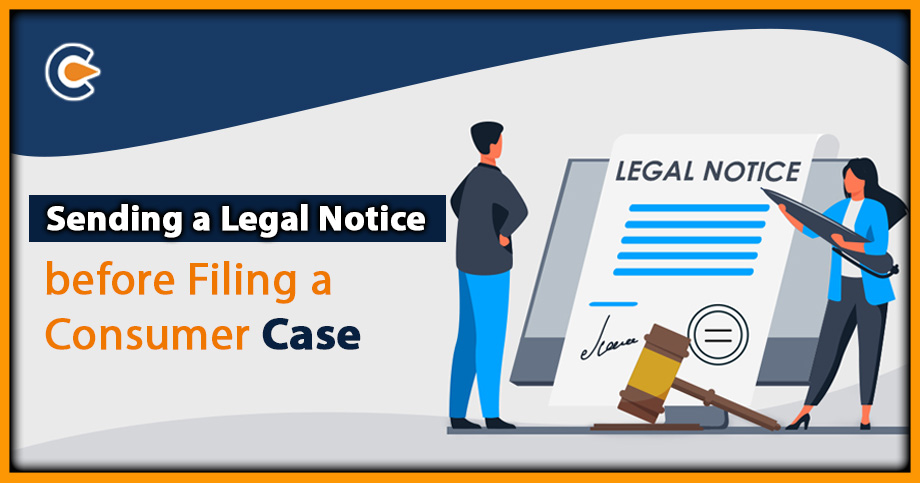In today’s world, consumerism is on the rise, and with it comes the need for consumers to be aware of their rights and take necessary actions when those rights are violated. One such action is filing a legal Notice for a consumer case to claim Compensation.
Consumer Case to Claim Compensation
Consumers are the backbone of any economy, and their rights should be protected. However, in some cases, businesses may violate consumer rights, causing harm, loss, or damage. In such situations, a legal notice on the consumer’s case is an important step to ensure that justice is served and the consumer receives compensation for their losses.
Here Are Some Important Things To Know About Filing A Consumer Case To Claim Compensation:
Identify The Issue:
- The first step is to identify the issue and the harm caused to the consumer. This could be a defective product, poor services, or any other violation of consumer rights that caused harm or loss to the consumer.
Collect Evidence:
- To strengthen the case, the consumer needs to collect evidence that supports their claim. This could include receipts, invoices, contracts, emails, or any other relevant documents.
Consult A Lawyer:
- It is advisable to consult a lawyer who specializes in consumer law. They can guide the consumer on the legal process and help them file the case.
File The Case:
- The consumer can file the case in the consumer court in their jurisdiction. They need to pay a fee and provide all necessary documents and evidence to support their claim.
Attend Court Hearings:
- Once the case is filed, the consumer needs to attend court hearings and present their case. The company or business also has the right to defend themselves and present their case.
Receive Compensation:
- If the consumer wins the case, they will receive Compensation for their losses. The Compensation could include financial Compensation, replacement of products, or any other remedy deemed appropriate by the court.
Consumer Protection Act, 2019
In India, the Consumer Protection Act of 2019[1] governs consumer cases. The Act provides for the establishment of consumer courts at the district, state, and national levels to hear and resolve disputes between consumers and businesses. The Act provides several legal provisions that regulate consumer cases, including the following:
Definition of Consumer:
- The Act defines a consumer as any person who purchases goods or avails of services for personal use, and not for resale or commercial purposes. This definition is crucial in determining whether a person can file a consumer case or not.
Right to File a Complaint:
- The Act provides consumers with the right to file a complaint against any unfair trade practices, defective products, or deficient services provided by businesses. The complaint can be filed by the consumer or their legal representative.
Jurisdiction of Consumer Courts:
- The Act provides for the establishment of three levels of consumer courts, i.e., the District Consumer Dispute Redressal Forum, the State Consumer Dispute Redressal Commission, and the National Consumer Dispute Redressal Commission. The jurisdiction of each court is based on the value of the goods or services in question.
Time Limit for Filing a Complaint:
- The Act provides for a time limit of two years from the date of the cause of action for filing a complaint in a consumer court. However, the court may allow for an extension in certain cases if there is sufficient cause.
Remedies Available to Consumers:
- The Act provides for various remedies that can be granted to consumers in case of a successful complaint, including Compensation for damages or loss, replacement of goods or services, refund of the amount paid, and punitive damages.
Appeal Process:
- The Act also provides for an appeal process, where either party can appeal against the order of the lower consumer court. The appeal must be filed within 30 days from the date of the order.
Role of Legal Notice in a Consumer Case
In a consumer case, a legal notice serves as a warning to the company or business that has caused harm or loss to the consumer, demanding compensation for the damages incurred. The role of a legal notice in a consumer case is significant and can be summarized in the following ways:
A Legal Notice Informs The Company Or Business Of The Issue:
- A legal Notice clearly outlines the issue faced by the consumer and the harm caused by the company or business. This serves as an official notice to the company that their actions have caused damage and Compensation is being sought.
A Legal Notice Provides The Company With An Opportunity To Resolve The Issue:
- Once a legal Notice is received, the company or business has a stipulated time to respond and resolve the issue. This gives the company an opportunity to rectify the mistake and offer Compensation without the need for legal action.
A Legal Notice Strengthens The Case Of The Consumer:
- If the company fails to respond or does not offer adequate Compensation, the consumer can use the legal Notice as evidence to strengthen their case in court. The legal Notice serves as proof that the company was notified of the issue and refused to take action.
A Legal Notice Sets A Deadline For The Company To Respond:
- A legal Notice sets a deadline for the company to respond, failing which legal action will be taken. This puts pressure on the company to take necessary steps to resolve the issue and avoid legal action.
A Legal Notice Is A Formal Document:
- A legal Notice is a formal and legally binding document that clearly outlines the issue and the Compensation being sought. This ensures that the company takes the matter seriously and acknowledges the harm caused to the consumer.
Legal Notice for Consumer Case to Claim Compensation
Here’s a step-by-step guide on how to send a legal Notice for a consumer case to claim Compensation:
- Identify The Issue:
The first step is to identify the issue and the harm caused to you as a consumer. For example, if you purchased a defective product or received poor services, and it caused financial loss or physical harm, you have a right to claim Compensation.
- Collect Evidence:
To strengthen your case, you need to collect evidence that supports your claim. This could include receipts, invoices, contracts, emails, or any other relevant documents.
- Consult A Lawyer:
It’s always advisable to consult a lawyer who specializes in consumer law. They can guide you on the legal process and help you draft the legal Notice.
- Draft The Legal Notice:
The legal Notice should be drafted in a formal and concise manner, stating the issue, the harm caused, and the Compensation you’re seeking. It should also include a deadline for the company to respond and resolve the issue.
- Send The Legal Notice:
Once the legal Notice is drafted, it should be sent to the company or business through registered post or email. Make sure to keep a copy of the notice and the receipt of delivery.
- Wait For A Response:
The company has a stipulated time to respond to the legal Notice. If they fail to respond or do not agree to your terms, you can proceed with filing a consumer case in the consumer court.
Conclusion
In conclusion, sending a legal notice for a consumer case to claim compensation can be a time-consuming process, but it’s necessary to protect your rights as a consumer. It’s always advisable to consult a lawyer and gather evidence to strengthen your case. Remember, consumerism works best when consumers are aware of their rights and take necessary actions to enforce them.
Read Our Article: Sending A Legal Notice Before Filing A Consumer Case











